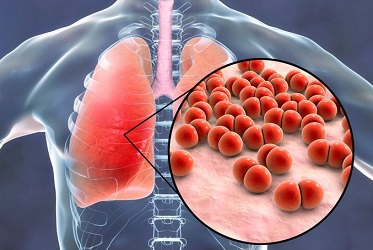Cases Of COVID-19 Associated Mycoplasma Pneumonia Especially Among Children Rising In Queensland-Australia
Nikhil Prasad Fact checked by:Thailand Medical News Team Feb 07, 2024 2 years, 1 week, 5 days, 22 hours, 29 minutes ago
Mycoplasma Pneumonia: In recent months, Queensland, Australia, has witnessed a concerning surge in cases of mycoplasma pneumonia, particularly among children. This bacterial infection, causing a severe lung infection with symptoms such as fever and a persistent cough, has prompted health officials to issue warnings and sparked a rise in hospital admissions. The situation in Queensland mirrors a global trend, with other countries experiencing similar outbreaks, raising questions about the potential for a new pandemic. This
Mycoplasma Pneumonia news report delves into the cases of mycoplasma pneumonia in Queensland, explores its impact on children, and examines the broader international context.
 Cases Of COVID-19 Associated Mycoplasma Pneumonia
Cases Of COVID-19 Associated Mycoplasma Pneumonia
Especially Among Children Rising In Queensland
The Rising Tide in Queensland
Queensland Health reported a significant increase in mycoplasma pneumonia cases, with 256 cases recorded last year and 229 cases already reported in the state this year. The spike, identified late last year, coincided with an unexpected rise in respiratory infections across Queensland, complicating diagnoses due to similarities with COVID-19 and respiratory syncytial virus (RSV). Dr Maria Boulton, a GP and president of the Australian Medical Association Queensland, highlighted the challenges in differentiating mycoplasma pneumonia from other respiratory illnesses without specific testing.
The Global Context
Australia's experience aligns with a broader global trend, as countries such as China and several European nations grapple with a surge in mycoplasma pneumonia cases, particularly among children. The highly contagious nature of the bacteria contributes to its rapid spread through respiratory droplets. Dr Michael Bonning, the president of the AMA NSW branch, noted that Australia's higher rates of mycoplasma pneumonia mirror the experiences of Asia, North America, and Europe.
China, in particular, has faced a significant rise in infections, with coughing and sneezing identified as primary modes of transmission. Reports from Chinese hospitals, including Beijing Children's Hospital, reveal overwhelming patient numbers and a strain on healthcare infrastructure. The situation echoes concerns raised by the World Health Organization (WHO) regarding undiagnosed pneumonia cases in Chinese children's hospitals, further complicating efforts to manage the outbreak.
Europe, too, has witnessed a surge in mycoplasma pneumonia cases, prompting fears of a new pandemic. Denmark, in particular, declared an epidemic as rates tripled over five weeks, with health officials anticipating a continued increase during the winter months. This global rise in mycoplasma pneumonia cases has led to heightened surveillance and alerts in countries such as India, Nepal, Taiwan, and Thailand.
Understanding Mycoplasma Pneumonia
Mycoplasma pneumonia is a bacterial infection that primarily impacts the respiratory system, causing symptoms such as f
ever, dry and persistent cough, and difficulty breathing. The infection spreads through droplets from an infected person's nose or throat, making it highly contagious, especially among children who often interact closely and touch various surfaces. Dr Bonning emphasized the importance of recognizing atypical reactions to respiratory illnesses in children, urging parents to seek medical assistance if symptoms persist.
The challenge in diagnosing mycoplasma pneumonia lies in its similarity to other respiratory illnesses, including COVID-19 and RSV. Dr. Boulton highlighted the need for specific tests to distinguish between these infections accurately. Given the contagious nature of mycoplasma pneumonia, preventive measures such as staying home when sick become crucial in controlling its spread.
Doctors are warning that there are certain individuals at risk of more severe disease from mycoplasma pneumonia infections. They are kids under the age of five, individuals over the age of 55, people with chronic conditions such as lung conditions and also people who are immunosuppressed
Conclusion
The surge in mycoplasma pneumonia cases, especially among children, in Queensland, Australia, reflects a broader global trend observed in countries such as China and various European nations. The contagious nature of the bacterial infection, coupled with its similarity to other respiratory illnesses, poses challenges for diagnosis and management. As health officials grapple with rising cases, the need for heightened awareness, timely medical intervention, and preventive measures becomes paramount in mitigating the impact of mycoplasma pneumonia on communities worldwide. The interconnectedness of global health underscores the importance of collaborative efforts in understanding, managing, and ultimately overcoming the challenges posed by infectious diseases like mycoplasma pneumonia.
For the latest on
Mycoplasma Pneumonia, keep on logging to Thailand Medical News.
